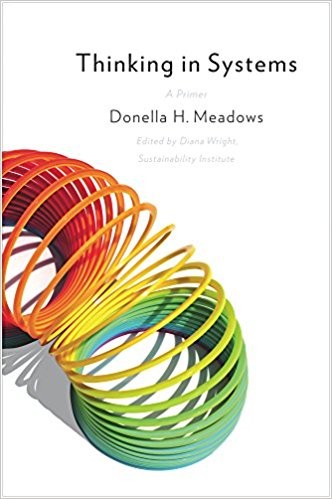Nils Müller liest reviewed Thinking in systems by Donella H. Meadows
Grundlegend, heute aber nur noch Grundlagen
3 stars
Das Buch, das zum ersten Mal Anfang der 1990er Jahre als Entwurf Beachtung fand und erst nach dem Tod der Autorin 2008 erstmalig offiziell veröffentlicht wurde, beschreibt die Grundlagen eines systemischen Denkens aus komplexen Zusammenhängen und Wechselwirkungen. Dabei fokussiert sich die Autorin in erster Linie auf die absoluten Grundlagen und beschreibt insbesondere die Funktionsweise von Regelsystemen mit mehreren In- und Outputs.
Für die "damalige Zeit" war das sicherlich in einigen Bereichen neu, aus heutiger Perspektive liest es sich jedoch sehr vereinfacht und ironischerweise unterkomplex. Mittlerweile ist das Denken über komplexe Systeme einfach bereits wesentlich weiter. Selbst mit Blick auf den Zeitpunkt seines Entstehens scheint mir dieses Buch ein Beispiel dafür zu sein, wie formale Wissenschaften wie Informatik oder VWL Phänomene entdecken, die informelleren Wissenschaften wie z.B. der Soziologie schon lange bekannt sind - und sie dann als Neuheit verkaufen. Als Transferleistung sicherlich zu würdigen, aber eben nicht als revolutionär neue …
Das Buch, das zum ersten Mal Anfang der 1990er Jahre als Entwurf Beachtung fand und erst nach dem Tod der Autorin 2008 erstmalig offiziell veröffentlicht wurde, beschreibt die Grundlagen eines systemischen Denkens aus komplexen Zusammenhängen und Wechselwirkungen. Dabei fokussiert sich die Autorin in erster Linie auf die absoluten Grundlagen und beschreibt insbesondere die Funktionsweise von Regelsystemen mit mehreren In- und Outputs.
Für die "damalige Zeit" war das sicherlich in einigen Bereichen neu, aus heutiger Perspektive liest es sich jedoch sehr vereinfacht und ironischerweise unterkomplex. Mittlerweile ist das Denken über komplexe Systeme einfach bereits wesentlich weiter. Selbst mit Blick auf den Zeitpunkt seines Entstehens scheint mir dieses Buch ein Beispiel dafür zu sein, wie formale Wissenschaften wie Informatik oder VWL Phänomene entdecken, die informelleren Wissenschaften wie z.B. der Soziologie schon lange bekannt sind - und sie dann als Neuheit verkaufen. Als Transferleistung sicherlich zu würdigen, aber eben nicht als revolutionär neue Erkenntnis.


